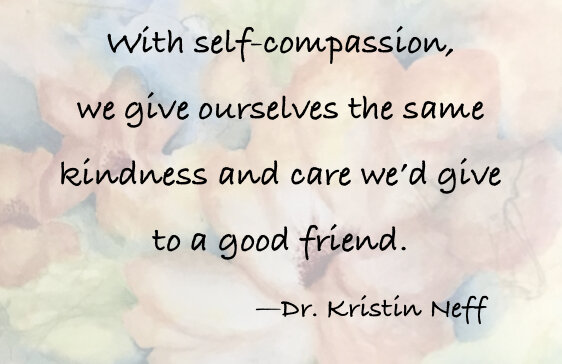Self-Compassion
“I’m my own worst enemy.” I hear that frequently throughout the week, as clients talk about their self-criticism and the efforts they make for positive change, only to feel like they take 3 steps backward when their inner critic steps up and points out everything negative.
In an achievement-focused culture that coined the term “imposter syndrome” (that feeling that we don’t belong here) and with thoughts that we don’t measure up, it’s hard not to compare ourselves to others. We often see failures as direct indicators of our self-worth, resulting in anxiety, procrastination and overall suffering.
Counseling teaches us how to be more compassionate to ourselves!
How do we move through this? While we hope to have a positive support system who can cheerlead us through the difficult times, cultivating compassion for yourself is also critical. Self-compassion is attending to your own suffering and treating yourself as you would your own friend, or someone who was experiencing a loss. We would be attentive, kind and nurturing in our compassion.
Three Components of Self-Compassion
Self-Compassion has been researched by Dr. Kristin Neff, who breaks it down into three components:
Self-Kindness - rather than judging ourselves when we fail or make mistakes, self-compassion engenders kindness. We acknowledge our pain and treat ourselves with warmth and understanding, reminding ourselves “I did my best” and “I’ve come back from things like this before.”
Common humanity - suffering is universal and we are not the only ones having a hard time or feeling inadequate. Rather than feeling like the only person who has ever screwed up a specific task, we remember we are not alone and imperfection is part of the shared human experience. It’s normal to feel vulnerable when we’re trying to learn new things.
Mindfulness -awareness of the present moment, without judgment, is essential in noticing our emotions and putting them in perspective. Mindfulness allows us to “let it be” rather than trying to change the present moment or avoid emotions, which then allows us to be compassionate for ourselves.
Learn more by listening to Kristin Neff talk about the difference between self-esteem and self-compassion.
How self-compassionate are you? Take this quiz.
Ready to learn more about self-compassion and cultivate it in your own life? Contact Kara to schedule an appointment! Don’t hesitate to call or email now!
Sources:
Neff, Kristin. Self-compassion: Stop Beating Yourself Up and Leave Insecurity Behind. New York: William Morrow, 2011.
Neff, Kristin, and Christopher K. Germer. The Mindful Self-Compassion Workbook: A Proven Way to Accept Yourself, Build Inner Strength, and Thrive. , 2018. Print.
Self-Compassion Self-Help Resources - Information Sheets & Workbooks (health.wa.gov.au)
Fierce Self-Compassion: A Conversation With Kristin Neff | Psychology Today
https://www.mindfulnessstudies.com/wp-content/uploads/2015/09/Self-Compassion_and_Mindfulness.pdf
Guided Meditations and Exercises (centerformsc.org)
Why Self-Compassion Trumps Self-Esteem (berkeley.edu)
Greater Good in Action (berkeley.edu)
Tara Brach Leads a Guided Meditation: The RAIN of Self Compassion - YouTube


